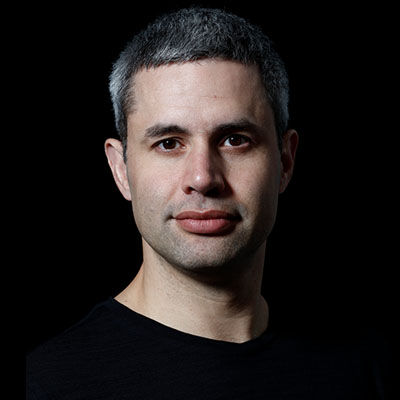Edward Lemke awarded an ERC Advanced Grant
PRESS RELEASE
Mainz, 31 March 2020 - Professor Edward Lemke at the Institute of Molecular Biology (IMB) has been awarded a prestigious ERC Advanced Grant from the European Research Council for his research in engineering designer organelles in cells.
ERC Advanced Grants are awarded to top researchers in Europe who are recognised leaders in their field. These grants allow them to pursue outstanding ideas that can eventually lead to new breakthroughs and major scientific advances. This year, the ERC awarded Advanced Grants to 185 researchers across 20 countries from all fields of research, out of 1,881 applications. As an ERC Advanced grant holder, Edward will receive approximately €2.5 million in funding to support his research.
Edward Lemke joined IMB in 2018 as an Adjunct Director and is a leading expert in deciphering the structure and function of proteins with flexible, dynamic structures, called intrinsically disordered proteins (IDPs). These proteins constitute up to 50% of the human proteome and play key roles in many diseases such as cancer and neurodegenerative disease. The disordered nature of IDPs allows them to have greater versatility and adaptability than rigid proteins, but also makes them particularly difficult to study.
Prof. Lemke’s group develops innovative techniques using synthetic and chemical biology to study the biological dynamics of IDPs at high temporal and spatial resolution. His group recently engineered designer organelles in cells with effectively two genetic codes that translate only specific RNAs to build proteins from natural and synthetic amino acids (Science 2019, 363:eaaw2644). This allowed them to incorporate fluorescent groups at specific locations in proteins. The technique opens the possibility of engineering cells to label proteins at multiple specific sites, which enables Prof. Lemke and his group to visualise and study their conformational changes at unprecedented resolution without altering the host physiology of the cell. In addition, the technology could be used to produce entire synthetic artificial proteins for new therapies in the future.
Further details
Further information can be found at https://erc.europa.eu/news/erc-2019-advanced-grants-results
Edward Lemke is an Adjunct Director at IMB and a Professor of Synthetic Biophysics at Johannes Gutenberg University Mainz. Further information about research in the Lemke lab can be found at www.imb.de/research/lemke.
About the Institute of Molecular Biology gGmbH
The Institute of Molecular Biology gGmbH (IMB) is a centre of excellence in the life sciences that was established in 2011 on the campus of Johannes Gutenberg University Mainz (JGU). Research at IMB focuses on three cutting-edge areas: epigenetics, developmental biology, and genome stability. The institute is a prime example of successful collaboration between a private foundation and government: The Boehringer Ingelheim Foundation has committed 154 million euros to be disbursed from 2009 until 2027 to cover the operating costs of research at IMB. The State of Rhineland-Palatinate has provided approximately 50 million euros for the construction of a state-of-the-art building and is giving a further 52 million in core funding from 2020 until 2027. For more information about IMB, please visit: www.imb.de.
About Johannes Gutenberg University Mainz
Johannes Gutenberg University Mainz (JGU) is a globally recognized research-driven university with around 31,500 students. Its main core research areas are in particle and hadron physics, the materials sciences, and translational medicine, while its most outstanding research achievements in the humanities have been attained in the fields of American Studies and Historical Cultural Studies. JGU's academic excellence is reflected in its success in the Excellence Initiative of the German federal and state governments: In 2012, the university's Precision Physics, Fundamental Interactions and Structure of Matter (PRISMA) Cluster of Excellence was approved and the funding of its Materials Science in Mainz (MAINZ) Graduate School of Excellence was extended. Moreover, excellent placings in national and international rankings, as well as numerous other honors and awards, demonstrate just how successful Mainz-based researchers and academics are. Further information at www.uni-mainz.de/eng.
Boehringer Ingelheim Foundation
The Boehringer Ingelheim Foundation is an independent, non-profit organization committed to the promotion of the medical, biological, chemical, and pharmaceutical sciences. It was established in 1977 by Hubertus Liebrecht (1931–1991), a member of the shareholder family of the company Boehringer Ingelheim. With the Perspectives Programme “Plus 3” and the Exploration Grants, the foundation supports independent junior group leaders. It also endows the internationally renowned Heinrich Wieland Prize as well as awards for up-and-coming scientists. In addition, the Foundation is donating a total of 154 million euros from 2009 to 2027 to the University of Mainz for the Institute of Molecular Biology (IMB). Since 2013, the Foundation has been providing a further 50 million euros for the development of the life sciences at the University of Mainz.
Press contact for further information
Dr Ralf Dahm, Director of Scientific Management, Institute of Molecular Biology gGmbH (IMB), Ackermannweg 4, 55128 Mainz, Germany, Phone: +49 (0) 6131 39 21455, Fax: +49 (0) 6131 39 21421, Email: press(at)imb.de
